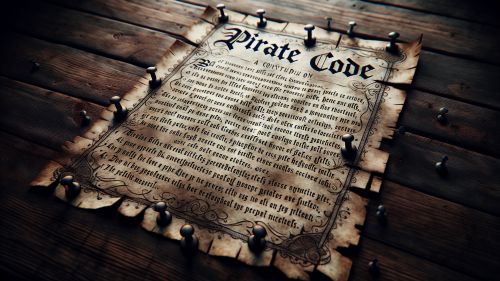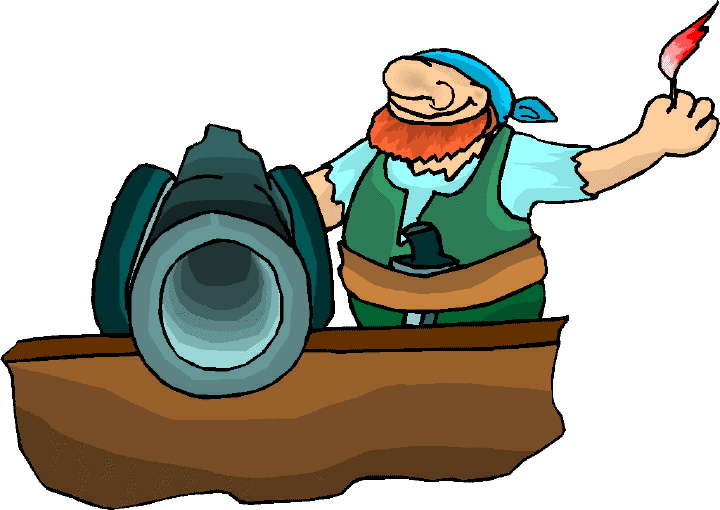 Pirates and Privateers Pirates and Privateers
The History of Maritime
Piracy
Cindy Vallar, Editor
& Reviewer
P.O. Box 425,
Keller, TX 76244-0425
    
Making Your
Mark
by Cindy Vallar
Before a pirate ship set sail upon the high sea, the
crew elected their captain and
drafted a document that outlined the division of
plunder and intolerable behaviors and their
punishments, many of which were designed to
forestall squabbles between pirates. Once these
Articles of Agreement or Codes of Conduct were set
down on paper, each pirate made his mark and swore
an oath to abide by them.

These revolutionary documents resulted from the
sailing experiences of these men prior to their
turning to piracy. Governments and institutions of
the seventeenth and eighteenth centuries were
autocratic and tyrannical. Life in general, but
aboard naval and merchant ships in particular, was
often harsh and short-lived. Insufficient food
supplies, low wages, high death rates, and strict
discipline led to frequent desertions. To prevent a
recurrence of these experiences, those who chose
piracy crafted a more equitable set of rules to
follow in which no one person was above another. A
pirate captain and possibly the quartermaster (whose
powers equaled or surpassed those of the captain)
might receive 1¼ to 2 shares of the loot taken,
while the master gunner, boatswain, and carpenter
might receive 1¼ shares. The remaining pirates
received one share each.
_-_Characters_of_Romance,_John_Silver.jpg) Pirates
belonged to a brotherhood and as such, they
instituted an early form of medical insurance within
their Articles of Agreement. Each crew decided
the worth of each injury, assigning the right arm
the most worth since many pirates were right-handed.
Compensation was also given for the loss of the left
arm, the legs, a finger, and one or both eyes.
Sometimes a wooden leg or a hand hook would also be
valued because a pirate who utilized either was as
dependent on its use as the man who lost a leg or
arm. At other times, a pirate who survived his
wounding but was disabled became a cook, carpenter,
or sailmaker, which enabled him to share in any
treasure because he provided a valuable service to
the ship and its crew. Recompense for injuries and
dismemberment came from the booty prior to its being
divided amongst the pirates. Pirates
belonged to a brotherhood and as such, they
instituted an early form of medical insurance within
their Articles of Agreement. Each crew decided
the worth of each injury, assigning the right arm
the most worth since many pirates were right-handed.
Compensation was also given for the loss of the left
arm, the legs, a finger, and one or both eyes.
Sometimes a wooden leg or a hand hook would also be
valued because a pirate who utilized either was as
dependent on its use as the man who lost a leg or
arm. At other times, a pirate who survived his
wounding but was disabled became a cook, carpenter,
or sailmaker, which enabled him to share in any
treasure because he provided a valuable service to
the ship and its crew. Recompense for injuries and
dismemberment came from the booty prior to its being
divided amongst the pirates.
When a pirate affixed his signature or mark to this
document, he pledged his honor to obey each rule.
While uttering this solemn oath, he placed his hand
on a Bible or a pair of crossed pistols or axes.
Occasionally, he sat astride a cannon or held a
human skull. No offense ever went unpunished. The
most serious violations called for marooning
or death. Lesser infractions might entail having his
nose and ears split. Any pirate who sailed under John
Phillips suffered Moses’ Law if caught smoking
belowdecks or carrying a lighted candle without the
protection of a lanthorn. Why? Fire was an
ever-present danger on board wooden sailing vessels.
Articles of Agreement evolved from Charte-Partie,
a legal document used by buccaneers in the late
seventeenth century. These charters, which Jamaican
courts used to settle disagreements, served three
functions: to explain terms of service, to provide
fixed compensation in case of death or injury, and
to divide plundered goods amongst the crew.
Eventually, the legality of these documents lessened
to the point where they became merely secret
charters under which pirate crews sailed. One of the
first descriptions of such a code appeared in 1678,
in The
Buccaneers of America, an account
written by Alexandre
Exquemelin about his years as a pirate
surgeon. Few of these documents survive today.
Perhaps the Articles of
Agreement most cited and most comprehensive
are those under which Bartholomew
Roberts and his crew sailed. These prohibited
gambling, forbade the presence of women, set forth
punishments, explained procedures for the settlement
of quarrels, provided for those injured in battle,
delineated the division of booty, and assured
musicians that they had at least one day of rest.
According to those
under which George
Lowther’s crew sailed, the first pirate who
sighted a ship to plunder received the best pistol
seized in the raid.
Violence and treachery were bywords of piracy. Yet
those same pirates plied their trade under Articles
of Agreement that were revolutionary social charters
of their day. These men believed in equality, and if
no prey was sighted, then no pay was earned. They
took care of their own by making restitution when
injuries were suffered. While they sailed under one
captain, they did not allow that man to be a
tyrannical dictator. Command power was shared
between the captain and the quartermaster, and these
officers could be demoted if the crew no longer
wished to follow their chosen leaders. These rights
were forerunners of the principles on which
democracies were founded.
Copyright ©2000 Cindy
Vallar

Click to contact me
Background image compliments
of Anke's Graphics |

